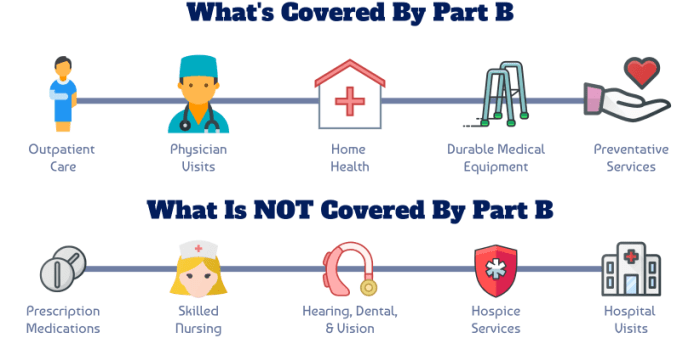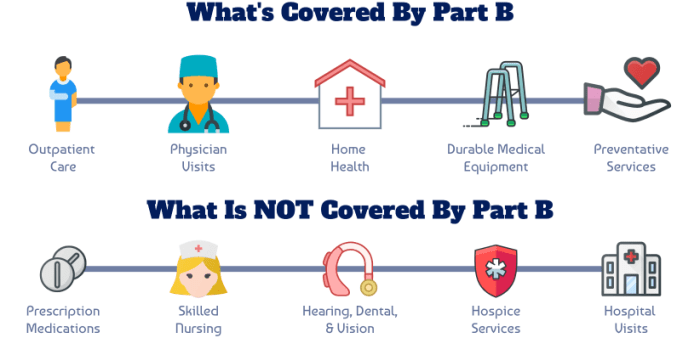Humana Medicare Part B, a crucial component of the Medicare program, provides coverage for essential medical services. This guide delves into the intricacies of Humana Medicare Part B, exploring its benefits, costs, enrollment processes, and how it interacts with other insurance plans.
Table of Contents
Understanding Humana Medicare Part B is essential for individuals navigating the complexities of healthcare in their later years. This comprehensive guide aims to equip readers with the knowledge needed to make informed decisions regarding their Medicare coverage, ensuring access to the healthcare they need when they need it.
Key Services Covered

Humana Medicare Part B, also known as Medical Insurance, helps cover doctor’s services, outpatient care, and some preventive services. It’s a valuable component of Medicare, working alongside Part A (Hospital Insurance) to provide comprehensive healthcare coverage.
Doctor Visits
Medicare Part B covers visits to your primary care physician, specialists, and other healthcare professionals. This includes routine checkups, consultations, and treatment for illnesses and injuries. The coverage for doctor visits is subject to certain limits. For example, you may have to pay a co-payment for each visit, and there may be an annual deductible.
Outpatient Procedures
Humana Medicare Part B covers a wide range of outpatient procedures, including:
- Diagnostic tests, such as blood work, X-rays, and MRIs
- Surgery, including minor procedures performed in a doctor’s office or outpatient surgery center
- Physical therapy, occupational therapy, and speech therapy
- Mental health services, such as counseling and medication
- Durable medical equipment (DME), such as wheelchairs, walkers, and oxygen
Similar to doctor visits, there are limits on the coverage for outpatient procedures. These limits can vary depending on the specific procedure. You may be required to pay a co-payment or coinsurance, and there may be an annual deductible.
Preventive Care Services
Medicare Part B covers a variety of preventive care services, including:
- Annual wellness visits
- Cancer screenings, such as mammograms and colonoscopies
- Immunizations, such as the flu shot and pneumonia vaccine
- Blood pressure, cholesterol, and diabetes screenings
To receive coverage for preventive care services, you generally need to get them from a healthcare provider who is enrolled in Medicare. You usually don’t have to pay a co-payment or coinsurance for these services.
Common Medical Services Covered by Humana Medicare Part B
| Service | Description |
|---|---|
| Doctor Visits | Visits to your primary care physician, specialists, and other healthcare professionals. |
| Outpatient Procedures | Procedures performed in a doctor’s office, outpatient surgery center, or other healthcare facility. |
| Diagnostic Tests | Tests such as blood work, X-rays, and MRIs. |
| Physical Therapy | Therapy to help you regain mobility and function. |
| Mental Health Services | Counseling and medication for mental health conditions. |
| Durable Medical Equipment | Equipment such as wheelchairs, walkers, and oxygen. |
| Preventive Care Services | Services such as annual wellness visits, cancer screenings, and immunizations. |
Humana Medicare Part B and Private Insurance
You might be wondering how Humana Medicare Part B interacts with other types of insurance. It’s common to have private insurance alongside Humana Medicare Part B to cover costs that aren’t covered by Medicare.
Medigap Plans
Medigap plans are supplemental health insurance policies that help cover out-of-pocket costs associated with Humana Medicare Part B. These plans are offered by private insurance companies and help pay for:
* Deductibles: The amount you pay before Medicare starts covering your healthcare costs.
* Coinsurance: The percentage of the cost you pay after Medicare pays its share.
* Copayments: A fixed amount you pay for certain services, like doctor visits.
* Foreign travel: Some Medigap plans offer coverage for medical emergencies while traveling outside the United States.
Choosing the Right Medigap Plan
Choosing the right Medigap plan depends on your individual needs and budget. You should consider factors like:
* Your health status: If you have pre-existing conditions, you might need a plan with more comprehensive coverage.
* Your budget: Medigap plans vary in cost, so it’s important to choose a plan that fits your budget.
* Your lifestyle: If you travel frequently, you might need a plan that offers coverage for medical emergencies abroad.
Medigap Plan Comparison
Here’s a table comparing different Medigap plan options and their benefits:
| Plan | Coverage | Costs |
|—|—|—|
| Plan A | Covers most of Medicare’s out-of-pocket costs | Higher premium |
| Plan B | Similar to Plan A, but with some additional benefits | Lower premium |
| Plan C | Covers most of Medicare’s out-of-pocket costs, including coinsurance | Higher premium |
| Plan D | Similar to Plan C, but with some additional benefits | Lower premium |
| Plan F | Covers all of Medicare’s out-of-pocket costs, including deductibles | Highest premium |
Humana Medicare Part B and Long-Term Care

Humana Medicare Part B is a crucial component of Medicare coverage, providing essential medical benefits for individuals aged 65 and older. However, it’s important to understand its limitations, particularly when it comes to long-term care needs. This section will explore the role of Humana Medicare Part B in covering long-term care, the limitations it presents, and alternative coverage options available.
Humana Medicare Part B Coverage for Long-Term Care
Humana Medicare Part B does not cover long-term care services directly. Its primary focus is on providing coverage for medically necessary services, such as doctor’s visits, preventive care, and certain medical equipment. While it may cover some short-term rehabilitation services following a hospitalization, it is not designed to address the ongoing needs of individuals requiring long-term care.
Limitations of Humana Medicare Part B for Long-Term Care
Long-term care services often involve assistance with activities of daily living (ADLs), such as bathing, dressing, and eating. These services are typically provided in a variety of settings, including nursing homes, assisted living facilities, and home care. Humana Medicare Part B does not cover these services unless they are deemed medically necessary.
Alternative Coverage Options for Long-Term Care
Given the limited coverage of Humana Medicare Part B for long-term care, individuals and their families need to explore alternative options to ensure adequate financial protection.
Long-Term Care Insurance
Long-term care insurance policies are specifically designed to cover the costs associated with long-term care services. They provide financial assistance for a range of services, including nursing home care, assisted living, and home health care.
Medicaid
Medicaid, a joint federal and state program, provides health insurance coverage to low-income individuals and families. It can also cover long-term care services for eligible individuals. However, Medicaid eligibility is based on income and asset limits, and it may require individuals to spend down their assets to qualify.
Veterans Benefits
Veterans who served in the military may be eligible for long-term care benefits through the Department of Veterans Affairs (VA). These benefits can include nursing home care, home health care, and adult day care.
Private Pay
Individuals can also choose to pay for long-term care services out of pocket. However, this can be an expensive option, as the costs of long-term care can vary widely depending on the type of care required and the location.
Comparison of Long-Term Care Coverage Options
| Coverage Option | Coverage | Eligibility | Cost |
|---|---|---|---|
| Long-Term Care Insurance | Covers a wide range of long-term care services, including nursing home care, assisted living, and home health care. | Individuals must meet health and financial requirements. | Premiums can vary depending on the policy’s coverage and the individual’s age and health. |
| Medicaid | Covers long-term care services for eligible individuals. | Individuals must meet income and asset limits. | No premium, but individuals may need to spend down their assets to qualify. |
| Veterans Benefits | Covers long-term care services for eligible veterans. | Veterans must meet eligibility requirements based on their service record and medical condition. | No premium, but benefits may be limited. |
| Private Pay | Covers all long-term care services. | No eligibility requirements. | Individuals are responsible for all costs. |
Humana Medicare Part B and End-of-Life Care

Humana Medicare Part B offers coverage for a range of medical services, including those related to end-of-life care. This coverage can help alleviate financial burdens and provide access to essential medical care during a challenging time.
Hospice Care Coverage
Humana Medicare Part B covers hospice care for individuals with a terminal illness. Hospice care focuses on providing comfort and support to the individual and their family, rather than curative treatments. To qualify for hospice care, a physician must certify that the individual has a life expectancy of six months or less.
Resources for Navigating End-of-Life Care Decisions
Humana offers resources to help individuals and their families navigate end-of-life care decisions. These resources include:
- Humana’s website: Provides information about end-of-life care options, including hospice care, palliative care, and advance care planning.
- Humana’s customer service: Can answer questions about Humana Medicare Part B coverage and provide referrals to local hospice providers.
- Humana’s care managers: Can help individuals develop a personalized care plan and connect them with the right resources.
Understanding Humana Medicare Part B Benefits Related to End-of-Life Care
Here is a guide to understanding Humana Medicare Part B benefits related to end-of-life care:
- Hospice care: Humana Medicare Part B covers hospice care for individuals with a life expectancy of six months or less. Hospice care is provided by a team of professionals who provide comfort and support to the individual and their family.
- Palliative care: Humana Medicare Part B may cover palliative care for individuals with serious illnesses, regardless of their life expectancy. Palliative care focuses on relieving symptoms and improving quality of life.
- Advance care planning: Humana Medicare Part B does not directly cover advance care planning, but it encourages individuals to discuss their end-of-life wishes with their doctor and family.
As you embark on your Medicare journey, understanding Humana Medicare Part B is crucial. This guide has provided insights into its core benefits, costs, enrollment process, and how it interacts with other insurance plans. By leveraging this knowledge, you can make informed decisions about your Medicare coverage, ensuring you have access to the healthcare you need throughout your later years.
Humana Medicare Part B covers a wide range of medical services, including doctor’s visits, outpatient care, and preventive screenings. If you’re looking for a more comprehensive plan, you might consider the Humana Honor HMO , which provides additional benefits like prescription drug coverage and vision and dental care. While the Honor HMO may not be right for everyone, it’s worth considering if you want a plan that covers more than just basic medical services.


